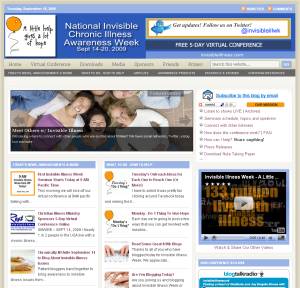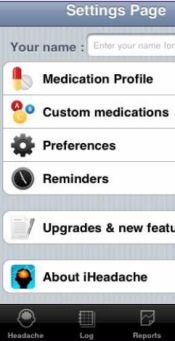Life and Migraine: A Review of the Documentary
Leaving the door to your apartment open? Getting a hobby? What do these things have to do with migraine? Read on to find out…
Life and Migraine is a rare thing: a documentary focused on telling the story of people dealing with migraine and what they had to go through before finding help. Thirteen people, both men and women, tell their stories, intertwined with a drama of a working woman trying to hold her life together while dealing with migraine’s horrible symptoms.

Barbara Coven stars as Jennifer Niehaus
The documentary was written, produced, and directed by Daniel Messina and Dr. Edmund Messina.
 Dr Edmund Messina |
Dr Edmund Messina is a neurologist who currently treats patients with migraine at the Michigan Headache Clinic. Throughout the documentary, he provides commentary, and other facts about migraine are shown on the screen for background.
So there’s a lot going on in this documentary, as you can tell. First, there’s the fictional but realistic story of Jennifer Niehaus, a teacher, wife and mom struggling with migraine. Next, the commentary and background. Finally, the comments by the 13 real people. And I should add not all of them are migraineurs, there are some cluster patients as well.
There are two versions of the documentary on the DVD; a broadcast version 27 minutes long, and a full version about 55 minutes long. With so much happening, the full version really is better, and I didn’t find it too long at all.
With that background, let me tell you what I liked and didn’t like about Life and Migraine, because there was a bit of both.
The Bad and the Good
First, let me say I’m so happy to see someone make a documentary like this. Everything here is important – hearing real people tell their stories, hearing the facts, and also seeing what it may be like to live with migraine in the drama. The interviewees, cast, and crew have put a lot of work into something that is worthwhile.
It’s obvious that this isn’t a multi-million dollar production, but it still comes across as something to be taken seriously.
I was left feeling there was some confusion over cluster, migraine and headache. I’m not suggesting the makers of the documentary are confused, but the differences were not clear. Even the cover of the DVD says,"a surprising documentary about people whose lives were ruled by headaches and how they found help"
Now we know that migraine is much more than headache – in fact many with migraine have other symptoms and no headache. But this wasn’t clear in the documentary. Also, those with cluster were not clearly identified. Cluster is very different from migraine – it would have been nice to at least clearly know who had cluster and who had migraine, and what the differences are, if both were to be included.
One more thing – and this isn’t really a criticism, maybe more of a heads up if you’re interested in the DVD (and I still recommend it – I’ll explain more in a moment). Early on Dr. Messina says that "this is a story of hope". Well, yes, there is hope here, but often it comes across as a story of frustration.
The drama of Jennifer Niehaus is harsh, as many real stories of life with migraine are. It’s not warm and fuzzy. Many of the people interviewed have frustrating stories to tell, and it’s not always clear how much help they found (though many did find help).
I don’t think this is a bad thing – it’s realistic. We need to emphasize that most people can probably find very significant relief from symptoms. But for many it takes a long time, and honestly some live with pain for many many years. Life and Migraine is not a fairy tale – it tells stories of hope but also faces the truth of migraine without apology.
In the end, I did like the documentary, and recommend it for a couple of reasons. First, I think it still sheds a lot of light on migraine for so many that just don’t know what it is. So many people interviewed went for years thinking they had sinus headache, or thinking that their symptoms were "normal". If more people watched this documentary, I really think more people would find help instead of suffering in silence.
Secondly, I think that this is an excellent resource for people who have migraine. Get a copy and show it to family and friends. Talk about it – are your experiences similar to someone in the documentary? Different? How? This could be such an amazing way to start discussion. In fact, I think this could be one of the best ways to help people understand that we’ve talked about here.
A Couple of Highlights
 Linda Polack and a bad doctor’s visit |
Let me finish with a couple of my favourite moments from the interviews. First, a jaw-dropping moment (though I shouldn’t have been surprised). Linda Polack was one of the women interviewed. She had never told a doctor about her headaches, and finally worked up the nerve one day.
After asking her several questions about her symptoms and medical history, he decided to have several tests done so that…. no wait, that’s not what happened.
She simply mentioned how often she had headaches, and he said,"Oh, your poor husband! … Well my dear, tell you what. You need to get a hobby. Your husband shouldn’t be coming home watching after these kids. You need to get a hobby. You need to pull yourself together and you need to do something so that you don’t have these headaches!"
!
As you may imagine, she wasn’t anxious to mention her pain again for a long time (and hence no treatment!).
One other interview made me laugh – not because it was funny, but because he said something that should have been strange and shocking, but because I know migraine I completely understood.
The interviewee was Dr. Sigrid J. Dixon. He said that he was in his apartment one day, and he had a terrible headache. It was so bad, that he opened the door to his apartment, so that if he died someone would eventually see the open door and realize something was wrong.

Dr. Sigrid Dixon
Opening the door…
If that seems normal to you, maybe you’ve had pain as bad as Sigrid and I.
Life and Migraine is a documentary more people need to see. People need to realize that they are not alone, and that together we need to fight migraine and cluster, and fight the misunderstanding of both. Hats off to the cast and crew for all the hard work they put into spreading understanding.
Visit the Life and Migraine website
Purchase Life and Migraine




